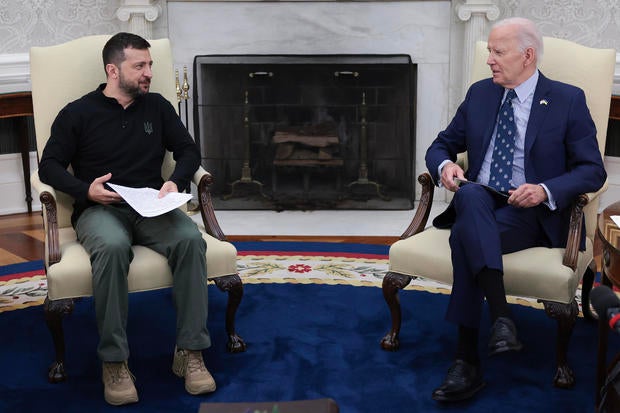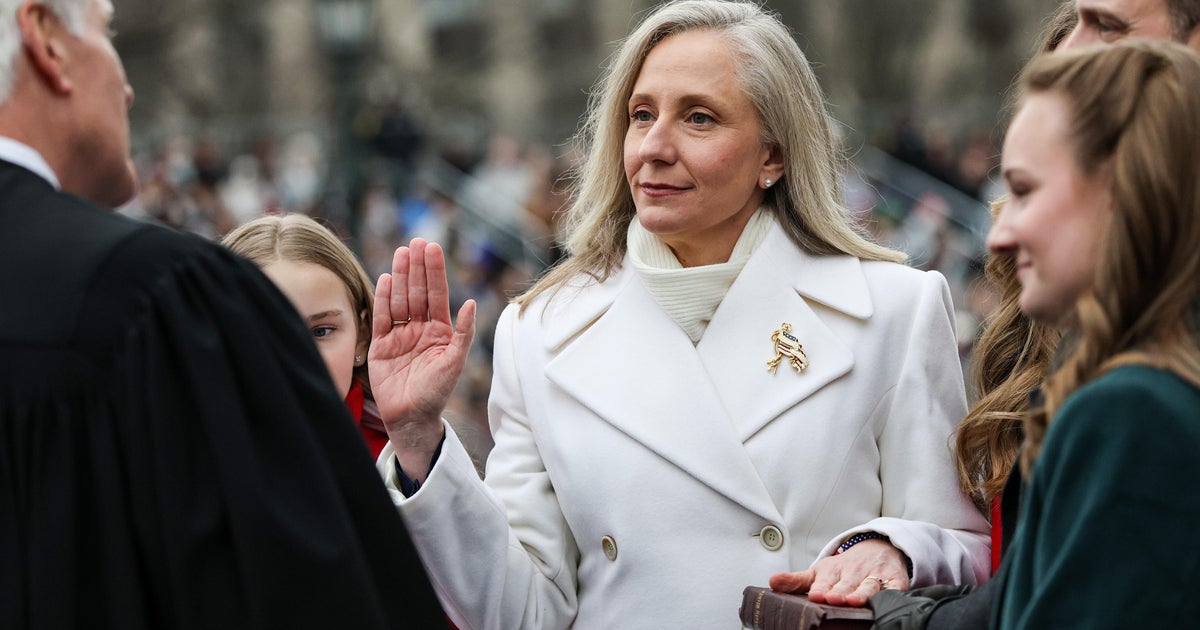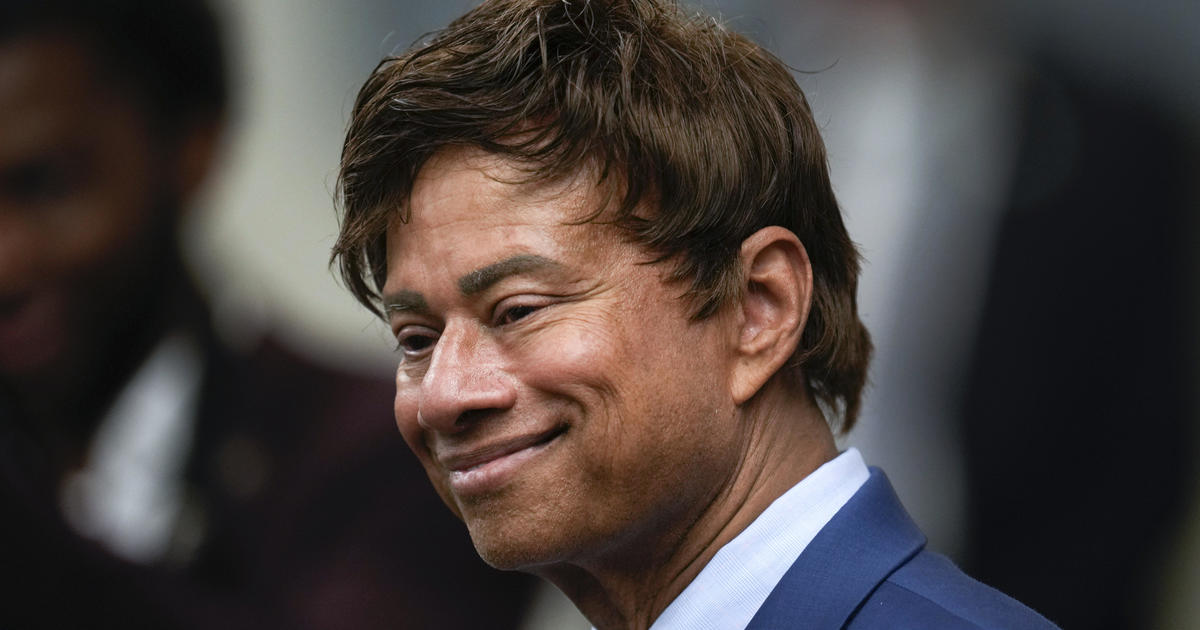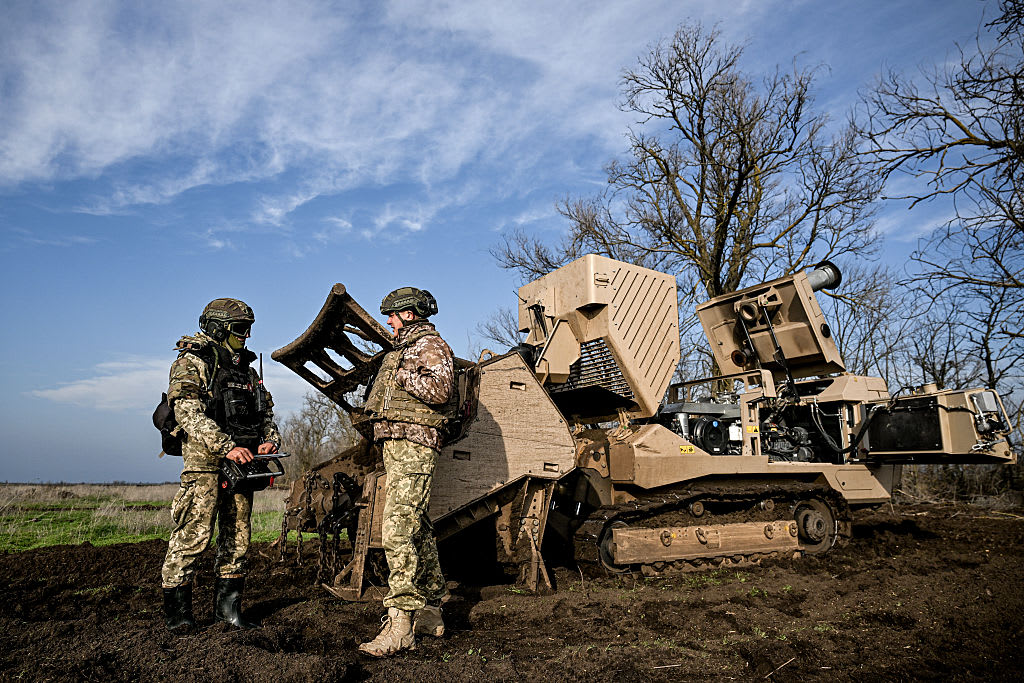Biden looks back on long foreign policy legacy, insists he is "leaving the next administration with a very strong hand"
With a world at war in Ukraine, the Middle East and Sudan, President Biden argued in a speech at the State Department on Monday that his administration has strengthened partnerships around the world, bettered the United States' position on the global stage and weakened key adversaries.
When Mr. Biden took office four years ago, he sought to reassure global allies and reestablish foreign treaties from which the Trump administration had withdrawn. The president reestablished strong relationships with leaders of NATO countries in the face of Russian President Vladimir Putin's invasion of Ukraine and reentered the Paris climate agreement. But world leaders have been preparing for significant changes with President-elect Donald Trump's impending inauguration.
"I come here to the State Department to report to the American people on the progress we've made in the last four years, in our foreign policy, in our presidency," Mr. Biden said. "I've said many times, we are at an inflection point. The post Cold-War era is over. A new era has begun. In these four years, we faced crises, we've been tested, we've come through those tests, stronger in my view, than we entered those tests. This is a fierce competition underway. The future of the global economy, technology, human values and so much else. Right now, in my view, thanks to our administration, the United States is winning the world-wide competition."
Specifically, the president made the case that the United States' partnerships and transnational institutions are significantly stronger than they were before he took office, a key claim of his presidency.
"Today, I can report to the American people, our alliances are stronger than they've been in decades," he said. "NATO is more capable than it's ever been. And many more of our allies are paying their fair share."
But the president also sought to make the case that the United States' "adversaries are weaker than they were when we came into this job four years ago."
Specifically, Mr. Biden said Russian President Vladimir Putin has "failed" to subjugate Ukraine and weaken NATO. The president touted his work to rally the world around Ukraine, another central piece of his foreign policy.
"As I saw it, when Putin launched his invasion, I had two jobs — one to rally the world to defend Ukraine, and the other is to avoid war between two nuclear powers," Mr. Biden said. "We did both those things. Today, Ukraine is still a free, independent country, with a potential, a potential for a bright future."
He also argued that Iran is weaker than it's been in "decades," saying Iran's main proxy Hezbollah is "badly wounded" and Iran's economy is in "desperate straits."
Something that has remained elusive for the Biden administration is the freeing of the hostages Hamas captured in Israel, which has been a top priority for the president and his aides. National security adviser Jake Sullivan said before Mr. Biden's speech on Monday the parties are "close to a deal and it can get done this week," but also said he couldn't make a promise or a prediction.
In his speech, the president briefly mentioned the soldiers who died during the chaotic and deadly withdrawal of U.S. troops from Afghanistan, while emphasizing that he has been the president to end United States' involvement in its longest war.
"We grieve all 2,461 Americans who made the ultimate sacrifice in the longest war in American history," he said. "And I grieve those brave service members whose lives were lost during the withdrawal."
Thirteen U.S. service members died in an attack outside of the Kabul airport amid the evacuation as the Taliban took over control of the country faster than the U.S. expected.
Mr. Biden also laid out the challenges ahead for the incoming Trump administration, which will have to deal with a chaotic Middle East, Russia's nearly three-year war on Ukraine and a tenuous situation in the Red Sea.
"Make no mistake, there are serious challenges the United States must continue to deal with, in Ukraine, in the Middle East, in the Indo-Pacific," he said. "Must keep the pressure on the Houthis who are attacking ships in the Red Sea, launching missiles at Israel, and firing at American forces. Must deter North Korea as they rattle their saber and draw closer to Russia. And new challenges will certainly emerge in the months and years ahead."
"But even — but even so, it's clear," he continued. "My administration is leaving the next administration with a very strong hand to play. And we're leaving an America with more friends and stronger alliances, whose adversaries are weaker and under pressure. An America that once again is leading, uniting countries, setting the agenda, bringing others together behind our plans and visions."
The president recently told USA Today that he had helped reset ties that had frayed during the Trump administration, saying he had managed an "inflection point" in history. He credited his long history in the Senate Foreign Relations Committee with helping him "navigate some of the fundamental changes taking place, whether it's in Europe, in Latin America, in the Middle East, in the Far East."
"The only advantage of being an old guy is that I've known every major world leader for a long time," he told USA Today's Susan Page. "And so I had a perspective on each of them and their interests."
Jake Sullivan said the president will argue "America is winning that contest for the future."
In his first foreign policy speech as president, in 2021, Mr. Biden aimed to tie foreign and domestic policy interests by arguing for a foreign policy for the middle class. The focus was meant to be on China and repairing alliances but was disrupted by crises in Ukraine and the Middle East.
"The United States is in a worse geopolitical position today than it was four years ago," says Stephen Wertheim, historian and senior fellow at the Carnegie Endowment for International Peace. "The United States is immersed in a massive war on the European continent with serious escalation risks; it's back to bombing the Middle East with no end in sight; and it has entered into a full-spectrum strategic rivalry with China."
A look at the major foreign policy issues of his presidency:
Ukraine, Russia and NATO
Mr. Biden has been a staunch supporter of Ukraine, becoming the first president to go to a conflict zone where U.S. troops were not involved and directing over $183 billion dollars in military aid since Russia's invasion in 2021. He played a key role in getting NATO to spend more on collective defense.
Yet the fierce battle continues on the frontlines with no clear plan for a peace deal. Washington deferred to Kyiv on when and how negotiations should take place with the tagline "nothing about Ukraine without Ukraine."
The administration was criticized early in the conflict for holding back on sending the most lethal weapons and later by some Republicans for spending too much money on Ukraine aid.
Mr. Biden is expected to argue that his policies have ensured the survival of Ukraine as an independent state and thwarted Putin's ambitions, a senior administration official tells CBS News.
Israel-Hamas war
After Hamas' Oct. 7, 2023, attack on Israel that killed over 1,200 civilians, Mr. Biden made it clear that Israel has the right to defend itself with his administration sending over billions of dollars worth of military assistance.
As Israel launched a war on Gaza that has killed more than 45,000 people according to the Hamas-run Gazan Health Ministry and led to a humanitarian crisis, the administration did not change its stance.
In April 2023, Mr. Biden told Israeli Prime Minister Benjamin Netanhayu that future U.S. support of his country was dependent on Israel protecting civilians and aid workers in Gaza.
"Biden willingly threw away his leverage by immediately pledging military support for Israel; then he criticized the Israeli government's decisions from the self-imposed sidelines," Wertheim said.
The State Department informed Congress earlier this month of a planned $8 billion weapons transfer to Israel. Ceasefire negotiations are still underway between Israel and Hamas as pressure mounts for a deal to be reached prior to Trump's inauguration on January 20.
Chaotic Afghanistan withdrawal
The most glaring foreign policy failure was the U.S. withdrawal from Afghanistan in 2021.
Mr. Biden had promised to end America's longest war and assured Americans that the Afghan military was capable of holding off a Taliban takeover. Instead the Taliban expanded its control of territory across the country more quickly than the U.S. expected and seized Kabul as the Afghan government collapsed. The U.S. hastily evacuated about 125,000 people, including 6,000 Americans, over the course of its frenzied withdrawal, but dozens of Afghans and 13 U.S. service members were killed in a suicide bombing outside Hamid Karzai airport in Kabul as thousands sought to flee the country.
U.S. citizens and Afghan allies who supported American troops throughout the war were left behind. Thousands feared retribution from the Taliban and felt abandoned by an American government that had promised to take care of them.
Images of Afghans clinging onto military planes in hopes of escape, and U.S. military weapons left behind and paraded about by the Taliban became emblematic of the missteps leading up to the evacuation.
In the three years since the Taliban returned to power, al Qaeda and other terrorist groups have established a presence in the country, and Afghan women and girls have been deprived of basic freedoms they enjoyed during two decades of Western-backed government following the U.S.-led invasion in 2001.
China
Trump began a trade war with China and other countries during his first term, imposing tariffs that were aimed at deterring what he saw as unfair trade practices and to encourage American consumers and businesses to buy and sell more goods made at home. While the rhetoric changed under Mr Biden, he nonetheless continued the tariff policy. And as was the case during the Trump administration, both have viewed China as a security threat, not just an economic one.
The Biden administration put safeguards in place to help protect industries like chip production from relying on China. Global alliances such as the Quad — U.S., India, Japan and Australia — and AUKUS – Australia, the U.S. and U.K. – made diplomatic and military headway in deterrence against China. And the Biden administration has also enhanced its military alliance with Japan.
Mr. Biden was vice president when former President Barack Obama delivered his "pivot to Asia" speech. American policymakers have been attempting to shift foreign policy focus ever since, but there has been a world of distractions along the way.
"The United States cannot expect to prioritize China while remaining the leading military power in Europe and the Middle East. If the United States truly wants to prioritize China, it needs to pull back elsewhere," Wertheim said.






